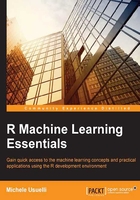
上QQ阅读APP看书,第一时间看更新
Conventions
In this book, you will find a number of text styles that distinguish between different kinds of information. Here are some examples of these styles and an explanation of their meaning.
Code words in text, database table names, folder names, filenames, file extensions, pathnames, dummy URLs, user input, and Twitter handles are shown as follows: "Load the randomForest package containing the random forest algorithm."
A block of code is set as follows:
[default]
arrayFeatures <- names(dtBank)
arrayFeatures <- arrayFeatures[arrayFeatures != 'output']
formulaAll <- paste('output', '~')
formulaAll <- paste(formulaAll, arrayFeatures[1])
for(nameFeature in arrayFeatures[-1]){
formulaAll <- paste(formulaAll, '+', nameFeature)
}
formulaAll <- formula(formulaAll)
When we wish to draw your attention to a particular part of a code block, the relevant lines or items are set in bold:
n1 + n2 [1] 5 n1 * n2 [1] 6
New terms and important words are shown in bold.
Note
Warnings or important notes appear in a box like this.
Tip
Tips and tricks appear like this.